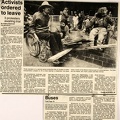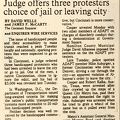Cincy orders protesters out
A May bus protest in Cincinnati has been described “as the most effective, courageous and fun action ever accomplished in the movement for disabled rights," according to literature mailed out by the American Disabled for Accessible Public Transit (ADAPT).
Some 85 members of ADAPT were in Cincinnati in mid-May to picket a regional convention of its arch-enemy, the American Public Transit Association (APTA) and to dramatize what a lack of accessible buses means to the disabled population of that Ohio city.
The action began with the customary march on the convention hotel on Sunday, May 18. No arrests were made but marchers were greeted at the Westin Hotel by police and double barricades.
None of the protestors was allowed into the hotel. Pointing out that other people were passed through the barricades, Bob Kafka of Austin, Texas, said the wheelchair protestors were being discriminated against.
However, Cincinnati police captain Dale Menkhaus said that such actions, were proper when taken to protect private property from any group seeking to disrupt other lawful gatherings.
The following day Kafka and fellow Texan George Cooper of Dallas dragged themselves onto a City Metro bus, paid their fares, and were arrested. They were reportedly told that “it’s not safe for disabled people to be on the regular bus.”
The two were later released on $3,000 bond and ordered out of town, an action that ADAPT leaders described as blatantly unconstitutional. A third protestor, Mike Auberger of Denver, who is a former resident of Cincinnati, was arrested when he attempted to block the bus on which Cooper and Kafka were riding.
Auberger said he originally left Cincinnati because of that city's “nineteenth century” attitude toward persons with disabilities. None of the Queen City Metro buses are accessible to the disabled, although 87 of the buses do have lifts which have been bolted down. Metro officials estimate it would cost them $350,000 to return those lifts to operational status.
A local Cincinnati disabled activist said that's why she agrees with ADAPT’s goals, even if she can't go along with their methods. Dixie Harmon, co-chairperson of the Specialized Transportation Advisory Committee to Queen City Metro and a member of the Greater Cincinnati Coalition of Persons with Disabilities, said that the city’s service for disabled riders was inadequate.
A disabled person must request space 24 hours in advance from Access, the paratransit system, but even then there's not always a space. “They dictate our lives to us because we have to go and come as there's space available.”
ADAPT members said that's why they were willing to go to jail to publicize their cause. Police, however, made no arrests when 15 wheelchair protestors rolled onto a highway where vehicles were traveling at 40 miles per hour and blocked seven buses that were carrying APTA delegates and their spouses to a dinner at the Pro Football Hall of Fame in nearby Canton.
Police were caught by surprise, as they had barricades to turn back protestors at the entrance to the Hall of Fame. Two local disabled leaders who were accompanying the APTA delegation to the dinner were taunted as “Uncle Toms” in front of TV cameras.
Early the next day ADAPT members were back in front of the Weston Hotel where they erected a huge cross and hung a wheelchair from it in a mock crucifixion.
On the final day of the convention, 17 protestors were arrested when they blocked the hotel driveway and refused police orders to move. Many of those arrested were ordered to jail unless they agreed to leave town. Three protestors, Auberger, Cooper and Kafka, decided the time had come for disabled protestors to do “hard time” and ended up serving 10 days.
Five other protestors were turned out of jail because they had special medical problems or speech impairments. Others were released after pleading “no contest” to the charges in hastily organized trials.
“Even the story we had left town and the protest was over made TV news," an ADAPT spokesperson said.
- Created on
- Thursday 11 July 2013
- Posted on
- Wednesday 8 June 2016
- Tags
- 24 hour advanced reservation, ADAPT - American Disabled for Accessible Public Transit, APTA - American Public Transit Association, arrests, banned from the city, blocking, Bob Kafka, College Football Hall of Fame, cost, cross, Dixie Harmon, George Cooper, Greater Cincinnati Coalition of Persons with Disabilities, inaccessible buses, jail, lifts bolted down, march, Mike Auberger, paratransit, safety, speech impairment, wheelchair
- Albums
- Visits
- 3750
- Rating score
- no rate
- Rate this photo


0 comments